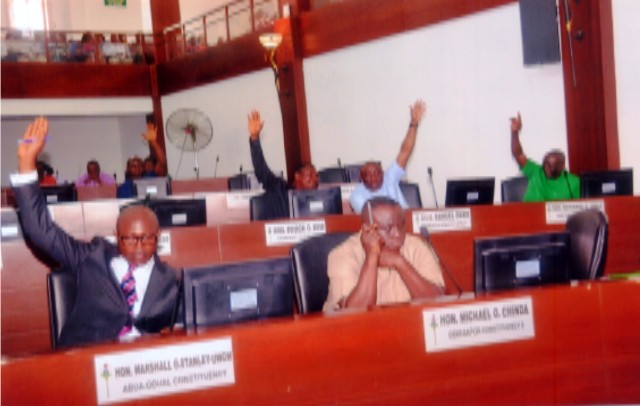Education
UNIPORT SSANU Re-Elects Chairman

Chairman of the University
of Port Harcourt branch of the Senior Staff Association of Nigerian Universities (SSANU), Mr Bikume Syder, has been re-elected to serve another four years term in the organisation.
Announcing the result of the election into various offices monitored by our correspondent, Chairman of the Electoral Committee, Dr Mike Ngeh, disclosed that out of the 669 senior staff accredited for the exercise, Mr Syder polled a total of 311 votes to emerge winner over his contender, Mr Ovunda Marcus who polled 227 votes.
Incumbent Vice-Chairman, Mr Bernard Chukwu, polled 359 votes to also return to office, Mrs Otami Akubom won the position of Secretary-General with 233 votes.
Mr John Nwajiobi emerged as new treasurer of the union with 313 votes, while Franklyn Isaiah was elected financial secretary with a total of 365 votes.
Also, Mr Peter Edoziem obtained 223 vote to secure the position of Public Relations Officer. While Mrs Elizabeth Amadi emerged as Assistant Secertary with a total of 395 votes. For the position of Women Leader, Mrs Elizabeth Akani got the slot with 244 votes. Mr Peter Ezi polled 418 votes to secure the position of Ex-Officio member. However Francis Nwigonee was elected Trustee of the branch with a total of 234 votes.
SSANU’s National Vice-President (East), Dr Leku Ador, who led other national and zonal officers of the association to observe the election, inaugurated the new executive council, charging those elected to discharge their duties in line with the extant rules governing the association.
“I charge you to see your victory as an opportunity to serve, rather than seeing it as an avenue to lord it over the rank and file of SSANU members in this branch. You must listen to those you are leading and ensure that you democratize all decision-making processes to carry everybody along in the scheme of things’, the National Vice-President admonished them.
In his acceptance speech, Mr. Syder reiterated his commitment to the welfare of SSANU members in the university. “I want to thank all members of SSANU of giving us their mandate to run the association for the next four years, including those who did not vote for us.
Let me on behalf of the new executive council restate our readiness to serve you by promoting our collective welfare,” the re-elected chairman said.
Presenting the account of his stewardship in the first four yeas which commenced in 2012, Mr Syder listed refurbishing of the SSANU Secretariat at Delta Park, procurement of a fifteen-seater Toyota Hiace Bus, settlement of debt owed the UniPort Branch of Non-Academic Staff Union (NASU), introduction of a Savings and Loans Scheme and upward review of welfare benefits due members, as some of his achievements in office.
“It is my hope that the focus of the union in this branch would be geared towards continued robust representation of members’ interest through constructive engagement with management, the building of a befitting permanent secretariat complex, staff conversation as first option of recruitment, consolidation of the SSANU-UniPort Welfare and Savings Scheme, loan facilities for members at 10% simple interest rate repayable over two years, quarterly presentation of accounts as enshrined in the recently amended SSANU constitution and sustenance of the union’s end-of-year get-together and christmas package, among other incentives,” Mr. Syder said.
Sogbeba Dokubo
Education
*SSS 3 Students Groan Over Difficulties in WAEC Capturing in Rivers*

Education
NCDMB commission Simulation Lab in Bayelsa University

Education
Bonny Federal poly appoints Deans, HOD’s ,Directors

-
Politics3 days ago
2027: NIGERIANS FAULT INEC ON DIGITAL MEMBERSHIP REGISTER DIRECTIVE
-

 Environment3 days ago
Environment3 days agoLAWMA Director Says Sweeping Reforms Have Improved Waste Collection
-
Politics3 days ago
LP Crisis: Ex-NWC Member Dumps Dumps Abure Faction
-

 Politics3 days ago
Politics3 days agoUmahi Dismisses Allegations On Social Media, Insists On Projects Delivery
-

 Sports3 days ago
Sports3 days agoAbia Not Sure To Secure continental Ticket
-
Politics3 days ago
NATASHA ELECTRIC VEHICLES INITIATIVE IN KOGI CENTRAL
-
Sports3 days ago
La Liga: Yamal Records First Career Hat-trick
-
Politics3 days ago
IT’S A LIE, G-5 GOVS DIDN’T WIN ELECTION FOR TINUBU – SOWUNMI

